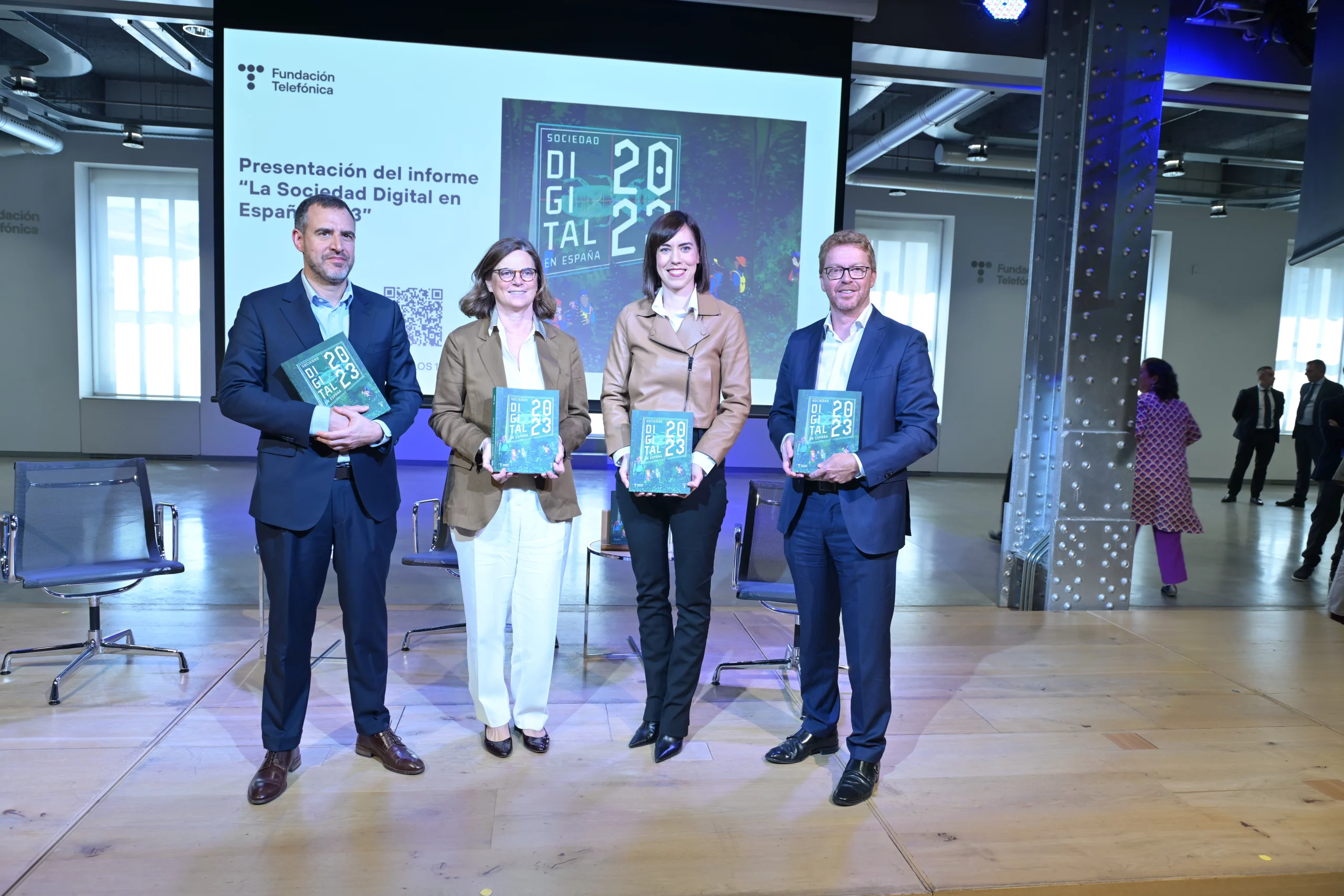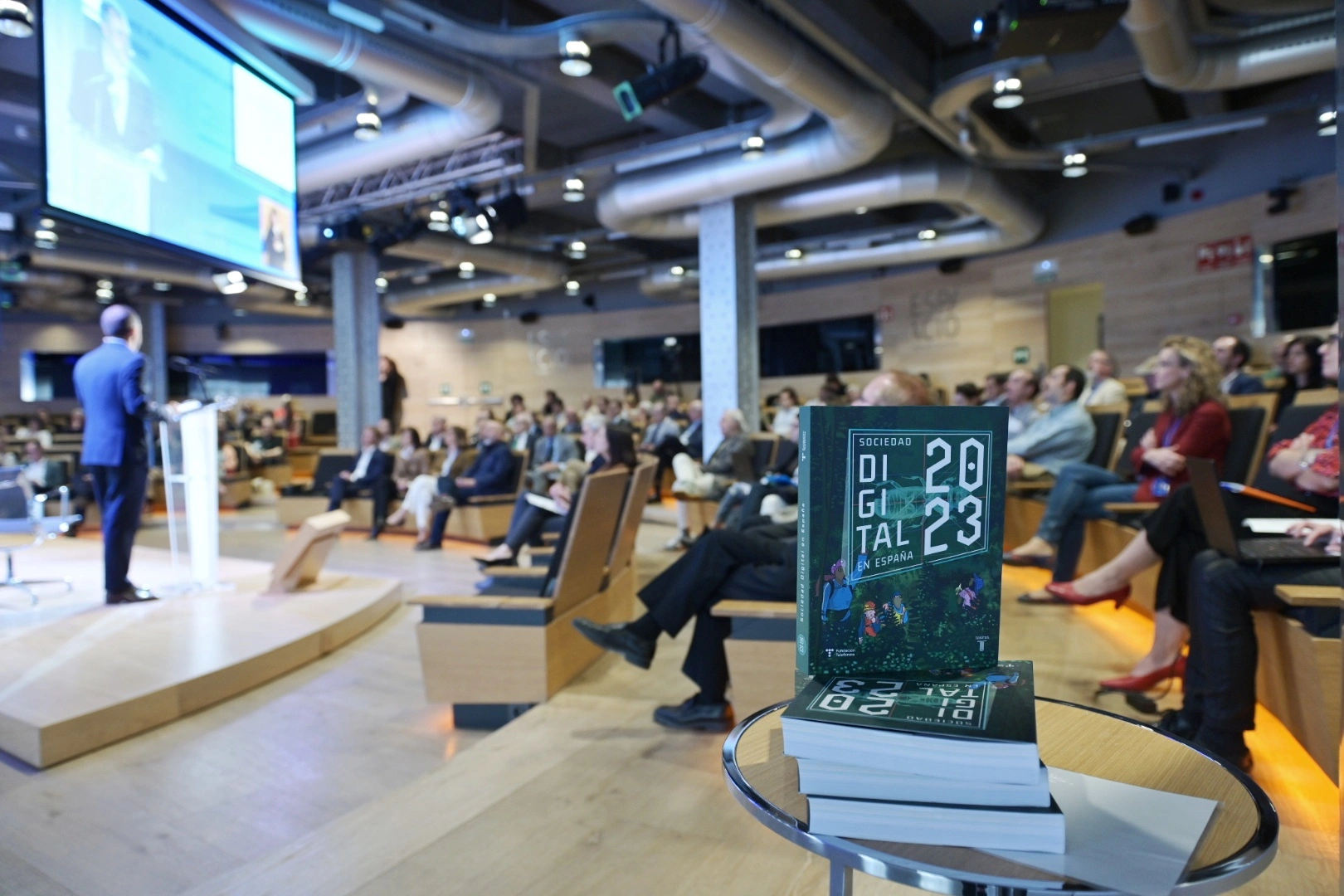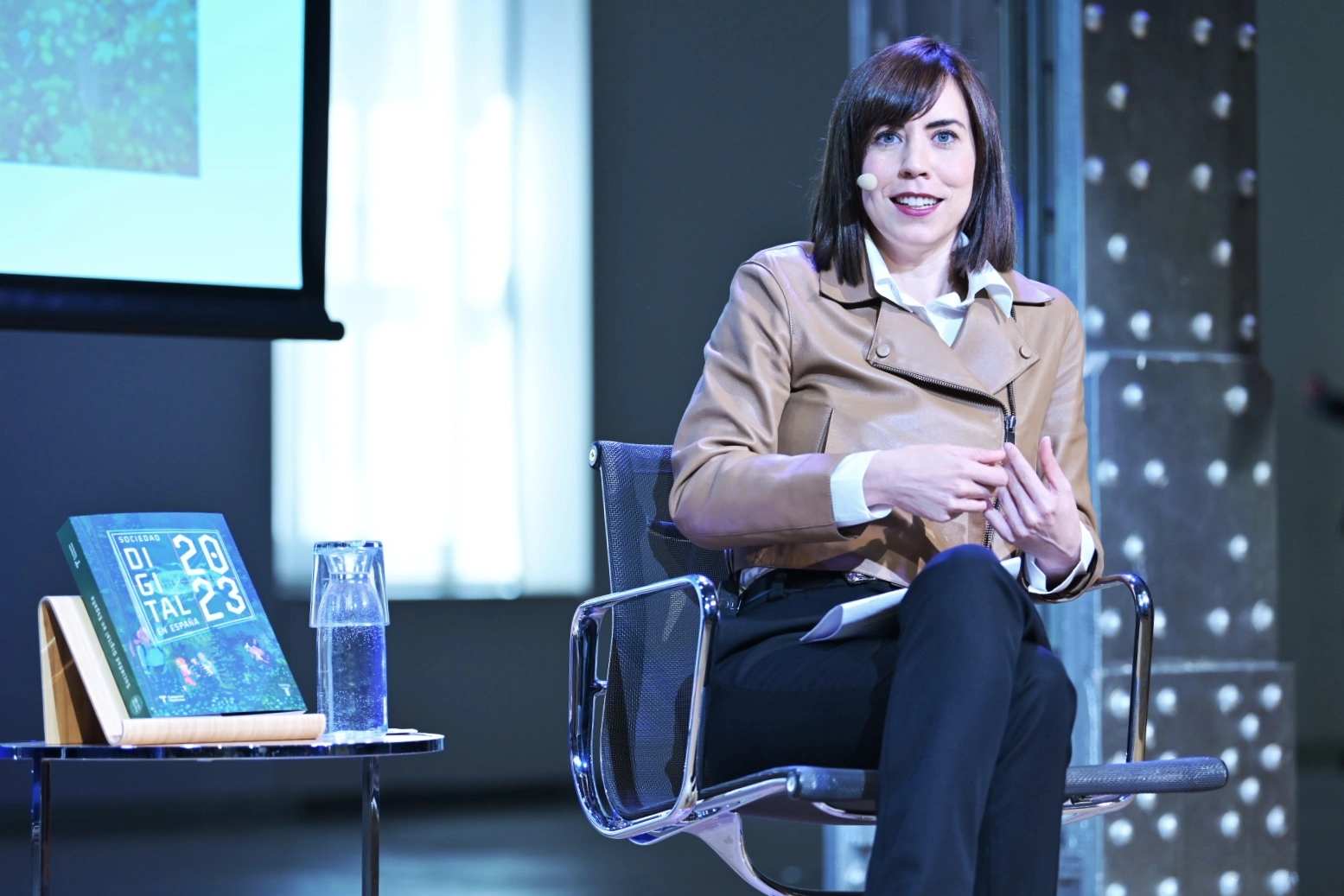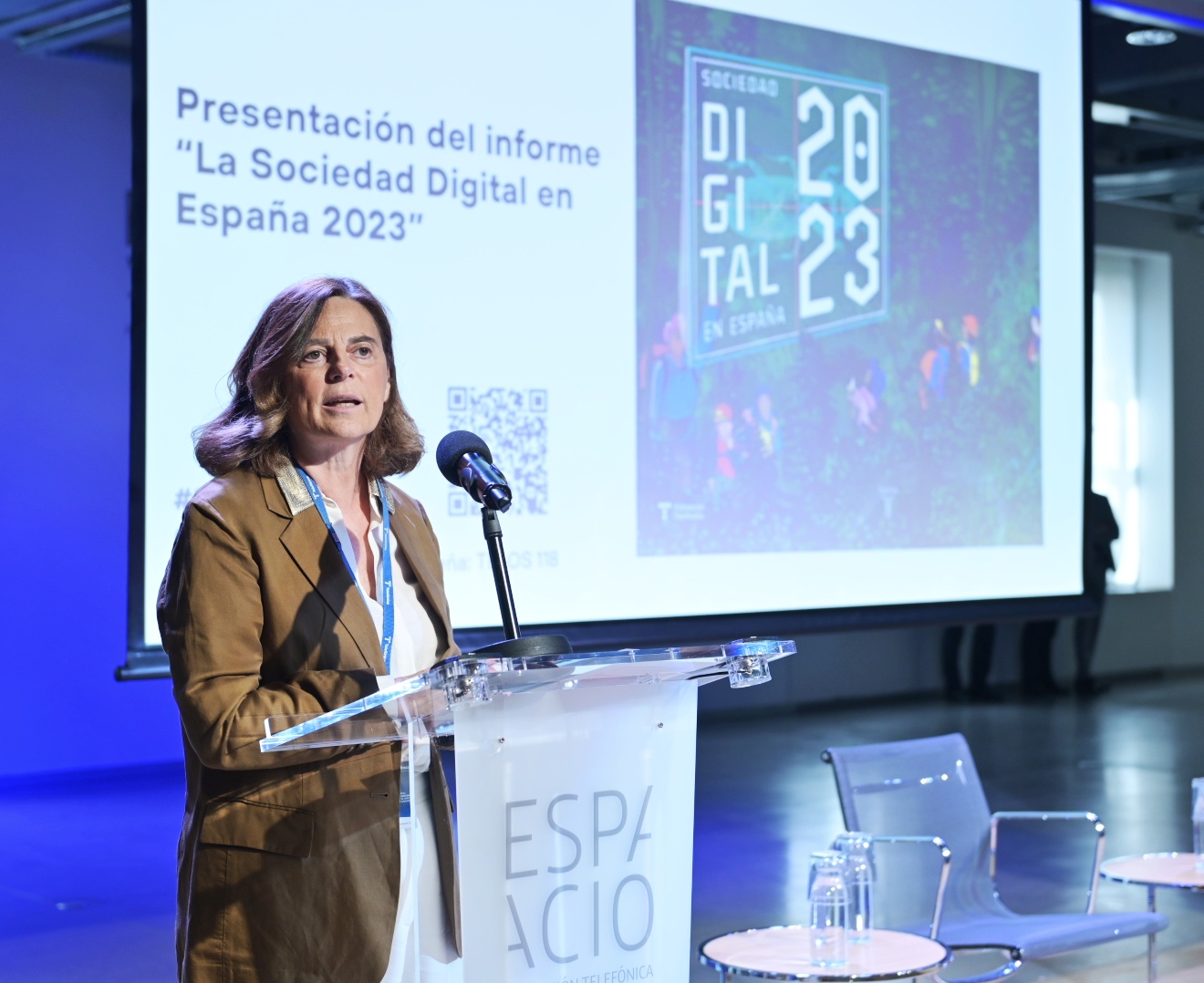15.06.2023
The regulatory change in the digital field, key to the promotion of Europe as a technological superpower
Unstoppable digitisation, the Internet at an open crossroads, Europe’s digital sovereignty and a fair contribution to ensure network efficiency and sustainability in the digital economy are the key reflections of this report.
The regulatory change in the digital field, key to the promotion of Europe as a technological superpower

The ‘Digital Society Report in Spain 2023’ traces the main technological trends and their evolution in 2022
We are facing a major global transformation, stemming from events such as the pandemic, Brexit, the war in Ukraine, inflation, rising inequality and the climate emergency. The future is surrounded by uncertainty and, at the same time, marked by a great technological revolution spearheaded by digitalisation.
It has concentrated progress in a much shorter time frame than technological leaps in the past. As a result, the undoubted benefits of progress are accompanied by increasing inequality, between those who adapt to change and those who do not, and threats such as loss of privacy, disinformation and cybercrime.
According to data from the ‘Digital Society Report in Spain 2023’, presented on 25th April at Telefónica Foundation Space and available for free download, the digital society in the world continues to advance, although at a slower pace than at the height of the pandemic.
In 2022, nearly two-thirds (66.3%) of the world’s population were Internet users. This percentage is 3.7 points higher than in 2021 (62.6%). In absolute terms, there were more than 5.28 billion Internet users, 338 million more than in 2021.
Given these data and the highly variable and uncertain environment in which we live, there are some key points for reflection. The following are some of the main conclusions of the ‘Digital Society Report in Spain 2023’.
Digital sovereignty, key to Europe’s transformation into a technological superpower
Europe missed the first technological wave, but it must be at the forefront of the next one and develop its own digital capabilities. The EU must seize the opportunity to transform itself into a technological superpower, define its strategic autonomy and exercise its regulatory power to shape the international digital environment.
In this context, the EU has already taken its first regulatory steps with the approval in 2022 of two fundamental rules for the ethical development of digital services: the Digital Markets Act (DMA) and the Digital Services Act (DSA), which will start to apply in 2023 and 2024, respectively.
While telecommunications revenues are decreasing, internet traffic is growing by 35% and more than 50% in the case of mobile data. At the same time, only six major digital platforms account for more than half of this traffic. Therefore, it is urgent to develop a new regulatory proposal that responds to the changes that the acceleration of digitization has brought, both at the European and Spanish levels.
It is essential to create a new legal framework suitable and adapted to the new developments and infrastructures. These new times require new rules of the game.
The strength of Spanish infrastructure
In this context, Spain is at a good pace in its digital transformation process and is the undisputed leader in terms of connectivity. The European Commission’s annual Digital Economy and Society Index (DESI) ranked Spain seventh in the list of member states in 2022, two places higher than in 2021. It is only surpassed in this area by Finland, Denmark, the Netherlands, Sweden, Ireland and Malta.
Spain is a country endowed with highly advanced infrastructure, both in relation to European countries and in the OECD framework, thanks to its early commitment to fibre optics in the previous decade and the rapid deployment of standard 5G mobile telephony that it has been carrying out in recent years.
The three levers of digitalisation
In this fast-changing global scenario, three factors can be considered drivers of digitalisation: education, digital talent and a secure internet.
Innovation in education
It is essential that educational systems evolve at the same pace as the economy and society. Schools must continue their efforts to equip themselves with technology and modernise their pedagogical activity. Similarly, there is a need to introduce training at all levels of education that provides technological skills such as computer programming, which is essential for future generations who will work side by side with artificial intelligence systems.
Digital talent in business
One of the main characteristics of the digital transformation in the field of employment is the spectacular growth in the demand for digital profiles. Eurostat data reveal that the number of ICT specialists in the European Union will grow by 50% between 2020 and 2021, a rate eight times higher than the growth of employment in the area.
In Spain, by mid-2022, DigitalES estimated that there were around 124,400 vacancies for digital profiles, mainly in the fields of software development, systems and cybersecurity.
Trust and security on the internet
More than half of Spanish citizens say they trust the internet quite a lot. However, Spain is one of the countries most concerned about misinformation, 62% of the population, second only to Portugal.
Also of concern is the growth of threats to organizations based on ransomware and malware that affects personal devices. The European Union Agency for Cybersecurity (ENISA) noted that between July 2021 and July 2022, ransomware and malware have continued to top the list of cyberattacks.
Key technologies for the new digital economy
The leap forward that is taking place in the field of infrastructures with the confluence of 5G and optical fibre has allowed the foundations of the digital world that is already under construction to be laid.
On the other hand, Web3 as a complement to the immersive internet and the metaverse, the new blockchain applications beyond cryptocurrencies, Industry 4.0 as complete automation of the traditional factory and the immense potential of drones are some technologies that have had milestones noteworthy in 2022.
Artificial intelligence is also experiencing a peak in popularity, to the point that the Real Academia de la Lengua named it “word of the year 2022”. It has continued to permeate Spanish society in 2022 in the form of services and applications. Along with other digital technologies, such as big data, the Internet of Things, the cloud and robotics, it encourages the transition towards more agile and versatile production models, the automation of activities and the acceleration of the responsible exchange of data to solve critical challenges and spur innovation.
Life in a digital society
For yet another year, entertainment services have become the driving force behind Spaniards’ use of digital technologies.
75.7% of internet users in the last three months have listened to or downloaded music from online services, 7.5 points higher than in 2020. Internet users who watch movies or series through streaming platforms are also growing significantly (10.5 points), reaching 65.6%. The only entertainment service that has seen its share fall is video games. Internet users who play or download games fell from 37% in 2020 to 35.4% in 2022.
Online banking users are also growing, in 2022 73.7% of internet users have accessed banking services online in the last three months, 6.2% more than in 2021.
In terms of e-commerce, purchases remain the same, but the frequency and spending is decreasing. The percentage of people who shopped online in the last three months reached 55.3%, one tenth more than in 2021. On the other hand, electronic commerce users will buy 2.8 times a month in 2022, a figure similar to that existing before the pandemic.
The return to normality has also had its reflection in the workplace, reducing the percentage of employed persons who teleworked. In 2021 the figure stood at 17.6% and in 2022 it falls to 14%.
Tackling disruption from an anthropocentric perspective
In 2022, the European Commission announced a political agreement between the European Parliament and the Council, the program ‘Europe’s Digital Decade: digital goals for 2030’, which refers to skills and infrastructure and the digitalization of business and public services. It also highlights the importance of having a digital rights framework for Europeans.
On the other hand, since 2021, Spain has had a Charter of Digital Rights, which does not have a regulatory nature, but which represents a reference framework to guarantee and bolster people’s rights in the digital world.
Telefónica, for its part, has proposed a digital pact between civil society, academia, the public and private sectors to leverage a digital transition centered on people.



